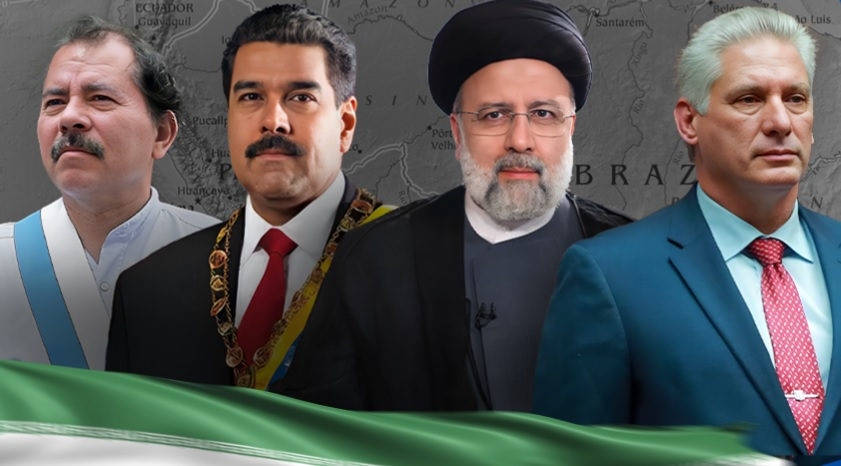
The Four Amigos: How the close alliance grew between the far Global South Flanks
There is no doubt that Iranian President Ibrahim Raisi's current visit to South American countries, Venezuela, Nicaragua and Cuba, constitutes a strengthening of Iran's course of cooperation with Latin American countries and the confrontation of unilateral US sanctions.
This path has brought the far one closer geographically, and has developed rapidly since the beginning of the new millennium, with the emergence of a new generation of Bolivarian leaders.
And with the presence of leaders such as the late Hugo Chavez, Evo Morales, Rafael Correa and Lula da Silva, some of these relations began to enter the stage of strategic alliances, especially during the years 2005-2013, as Iran became an observer member of the Bolivarian Alliance for the Peoples of Latin America, ALBA, in 2008, in one of the manifestations of these Alliances.
As a continuation of this rapprochement, Iran and Venezuela signed more than 270 agreements between 2005 and 2012, which included automobile manufacturing projects, energy programs, and others.
In 2019, following the coup of Venezuelan Parliament Speaker Juan Guaido against elected President Nicolas Maduro and the United States announcing his recognition, America froze the Venezuelan government's assets abroad, and exacerbated the suffering of Venezuelans, in conjunction with a humanitarian crisis that struck the world as a result of the spread of the Corona virus and the subsequent economic recession.
Iran sent 5 tankers of oil derivatives to Caracas to alleviate the unprecedented fuel crisis, and helped repair a number of Venezuelan oil refineries that were damaged by US sanctions, in a message confirming the strength of this alliance, and a challenge to the hegemony of the United States whose patrols in the Caribbean did not dare to intercept the fleet yet. Iranian warnings.
The first year of Iranian President Ebrahim Raisi's term did not pass, until he signed with his Venezuelan counterpart in Tehran a map of bilateral cooperation between the two countries in June 2022. Subsequently, Raisi handed over, in a ceremony via video technology, the second Iranian-made Venezuelan oil tanker, and committed Renovation of the largest oil refinery complex in Venezuela.
For his part, the Iranian president stressed, in a joint press conference with his Venezuelan counterpart, that "relations between Tehran and Caracas are not ordinary diplomatic relations, but rather strategic relations," noting that the two countries have "common opponents, common interests and common views in the areas of seeking independence, freedom and justice."
The Iranian president participated in the ceremony of resuming the production line of two Iranian companies for cars and tractors in Venezuela, and said during the visit: "The volume of trade exchange can be increased to 10 billion dollars in a first step, and to 20 billion dollars in a second step," after the exchanges increased from 600 million dollars in 2008. 2021 to more than $3 billion.
During his meeting with Iranian and Venezuelan businessmen, he stressed that there is a great untapped potential to increase economic exchanges between Iran and Venezuela, and stated that the way to achieve the $20 billion agreements is serious activity and investment between the two countries.
The memorandums of cooperation included the sectors of communications and information technology, energy, insurance, maritime transport, higher education, agriculture, medicine and medicine, culture, and the mining sector, in addition to Iran’s decision to transfer micro and nanotechnology through government and private institutions, in order to build a model of Iranian-Venezuelan partnership and integration. It can circulate in a lot of countries that want an equal relationship.
These agreements provide opportunities for mutual investment in the field of agriculture, facing food security problems and exchanging commodities.
Commenting on the economic sanctions imposed by the United States on Venezuela, Roy Warran tells Al-Mayadeen Net: "Iran has a clear position against sanctions, and it rejects them completely, whether sanctions against Iran or any other country." He adds, "Our position is principled against sanctions. Therefore, Iran sent tankers carrying oil production requirements to Venezuela, in a practical step to refuse, whatever the price."
In the same context, since February 2023, two ships carrying Iranian products have arrived at Venezuelan ports, after the Iranian-Venezuelan shipping line was recently launched, as the Iranian-Venezuelan cooperation map stipulates that a ship sails from Iranian shores heading to Venezuela every 3 months.
"A large part of Venezuela's refining sector, which was neglected due to sanctions, has been put into operation with the help of Iranian experts," said Iranian Oil Minister Javad Auchi.
Iran will provide technical and engineering support, as well as equipment, to help modernize petrochemical complexes, loading docks and oil terminals in Venezuela.
After the Venezuelan president's visit to Tehran in 2022, the state oil company "Petroleos de Venezuela" and the state-owned National Iranian Oil Refining and Distribution Company worked to renovate the "Paraguana" refining center, the largest refining complex in Venezuela, in a move to end Venezuela's dependence on American refinery technology. .
A unit of the National Iranian Oil Refining and Distribution Company had earlier signed a contract worth 110 million euros with Petroleos de Venezuela last May to repair the El Palito oil refinery, which has a capacity of 146,000 barrels per day.
Since December 2022, Iranian commercial ships have been moving along the road leading to Venezuela to transport petrochemical products, primarily naphtha, which Venezuela needs in the production of Venezuelan oil.
































